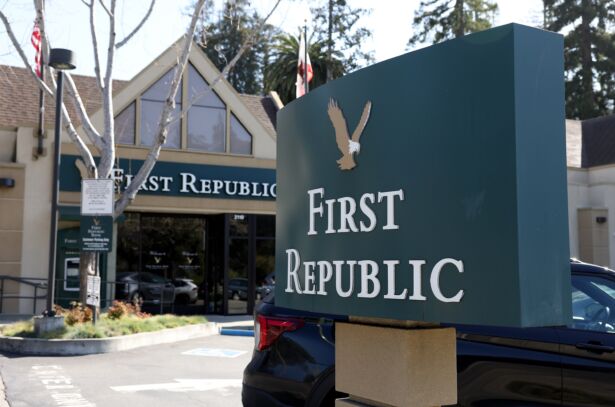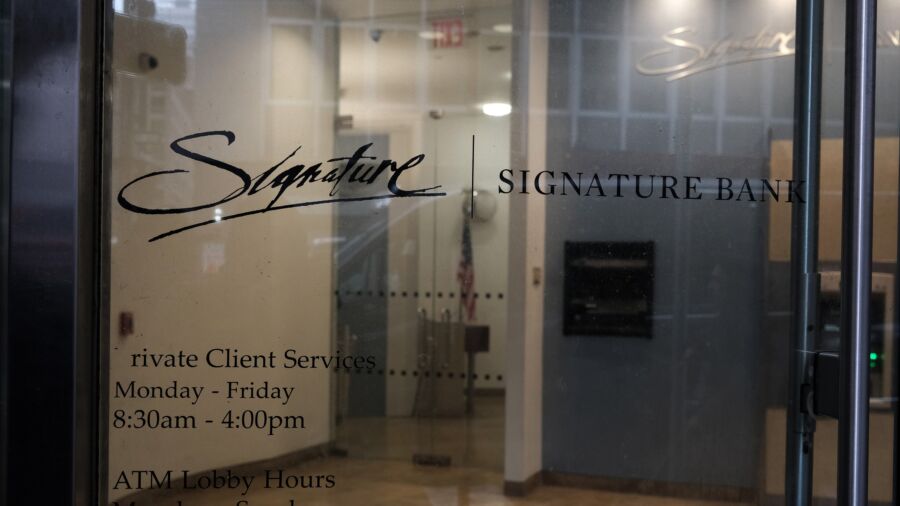A subsidiary of New York Community Bank will purchase a significant portion of failed Signature Bank under a $2.7 billion deal with U.S. regulators, the Federal Deposit Insurance Corporation (FDIC) announced on March 19.
The FDIC, an independent agency created by Congress to maintain a stable financial system, said that Sunday’s deal will see the 40 former branches of New York-based Signature Bank become Flagstar Bank, beginning March 20.
Depositors of Signature Bridge Bank—excluding those related to the digital banking business—will automatically become depositors of Flagstar Bank.
Signature Bridge Bank was created by the FDIC earlier this month to take over Signature Bank’s operations after it was closed by New York state regulators in the wake of its collapse.
The closure came just 48 hours after the collapse of Silicon Valley Bank.
“The (FDIC) entered into a purchase and assumption agreement for substantially all deposits and certain loan portfolios of Signature Bridge Bank, National Association, by Flagstar Bank, National Association, Hicksville, New York, a wholly owned subsidiary of New York Community Bancorp, Inc., Westbury, New York,” the FDIC said in a statement.
The FDIC noted that the newly Flagstar Bank-operated branches will be open during normal business hours but that customers of Signature Bridge Bank should continue to use their current branch until they are informed by Flagstar Bank that full-service banking is available to them at its branches.
FDIC to Bail Out Signature Bank’s Digital Banking Business
“All deposits assumed by Flagstar Bank, N.A., will continue to be insured by the FDIC up to the insurance limit. Flagstar Bank’s bid did not include approximately $4 billion of deposits related to the former Signature Bank’s digital banking business,” the FDIC said. “The FDIC will provide these deposits directly to customers whose accounts are associated with the digital banking business.”
Signature Bank reported $110.36 billion in assets and a total of $88.6 billion in deposits as of Dec. 31, 2022.
New York Community’s deal with regulators includes the purchase of roughly $38.4 billion of Signature Bridge Bank assets, including loans of $12.9 billion, bought at a discount of $2.7 billion, the FDIC said.
Roughly $60 billion of Signature Bank’s loans and $4 billion of its deposits—those related to Signatures’s digital banking business—will remain with the FDIC in receivership.
Additionally, the FDIC received equity appreciation rights in New York Bank common stock with a potential value of up to $300 million.
Overall, the agency estimates the latest deal will cost its Deposit Insurance Fund, which is paid for by bank assessments and interest earned on funds invested in U.S. government obligations, approximately $2.5 billion, although the exact costs will be determined at a later date.
The agency previously reported that the fund had held $128.2 billion at the end of 2022.
Back-to-Back Failures
Signature Bank became the third-largest bank failure in U.S. history after it was shuttered by regulators in the wake of Silicon Valley Bank’s collapse, which was the second-largest in U.S. history behind Washington Mutual’s failure during the 2008 financial crisis.
The latest back-to-back failures have sparked concerns of a more widespread banking collapse and prompted customers with deposits at under-pressure banks to withdraw their money.
In Switzerland, Credit Suisse averted a liquidity crisis after it was taken over by UBS. Back in the United States, First Republic Bank needed a cash infusion from lenders like JPMorgan Chase, Bank of America, and Citigroup to stay afloat to meet depositor withdrawals.

In an effort to stave off further withdrawals, which could potentially create more volatility and risk derailing the economy, the Biden administration has sought to quell Americans’ fears and reassure them that the U.S. banking system remains stable.
Sunday’s announcement comes after New York Governor Kathy Hochul also sought to ease concerns over the state’s banking system, while explaining the steps her administration has taken to protect depositors in the state.
“Our view was to make sure that the entire banking community here in New York was stable, that we can project calm, that this is a time when we could manage a certain narrow situation and to make sure that that did not get any worse and that was what our objectives were,” Hochul told reporters at a press conference in Manhattan last Monday.
“The main message I want to deliver is New Yorkers should have confidence that their money is secure. Wherever they’ve chosen to bank, that is protected,” Hochul added.
Reuters contributed to this report.
From The Epoch Times

